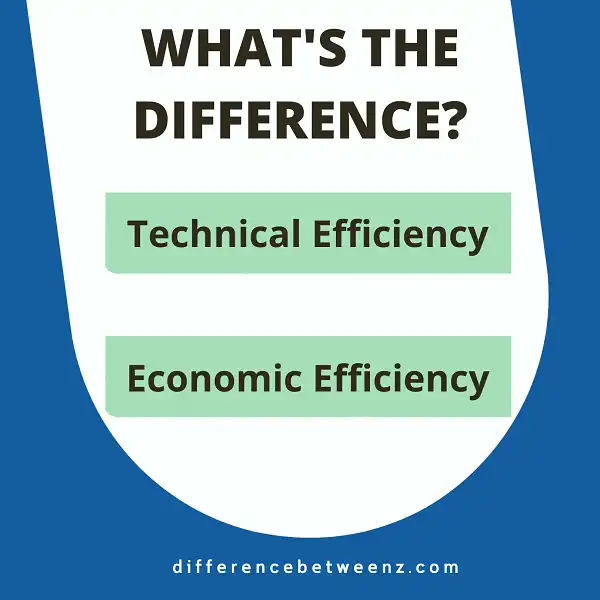Technical efficiency and economic efficiency are two key concepts in economics. Many people use these terms interchangeably, but they actually have different meanings. In this post, we will explore the difference between technical efficiency and economic efficiency and explain how each concept is important. We will also provide examples to help illustrate these concepts. Ultimately, understanding the difference between technical efficiency and economic efficiency can help you make more informed decisions when it comes to your finances.
What is Technical Efficiency?
Technical efficiency is the term used in economics to describe the relationship between the inputs used in production and the output of that production. Technical efficiency occurs when all of the inputs are being used in such a way that there is no waste and the maximum possible output is being produced. When an economy is technically efficient, it is using its resources to its fullest potential. Technical efficiency is often thought of as the ideal level of productivity. However, it is important to note that technical efficiency does not necessarily mean that an economy is operating at its optimal level. There can be many factors that prevent an economy from achieving its full potentials, such as market failures or externalities. Technical efficiency is a useful concept for understanding how an economy works and for identifying areas where improvements can be made.
What is Economic Efficiency?
Economic efficiency is the state in which resources are optimally allocated so that there is no wasted effort or cost. In other words, economic efficiency occurs when production costs are at their lowest possible level and when goods and services are produced at the greatest possible output. Economic efficiency is usually associated with perfect competition, in which there are numerous small firms producing identical products and no barriers to entry or exit. Under these conditions, firms will be motivated to produce at the lowest possible cost in order to remain competitive. Economic efficiency can also be achieved through government regulation, which can ensure that firms are producing at the lowest possible cost while still providing a high level of quality.
Difference between Technical Efficiency and Economic Efficiency
Technical efficiency and economic efficiency are two important concepts in economics. Technical efficiency refers to the level of output that can be achieved given the inputs, while economic efficiency takes into account the cost of the inputs as well. For example, a company that produces 100 widgets with 10 workers is technically efficient, but if it costs more to hire the workers than the widgets are worth, then the company is not economically efficient. In general, companies strive to be both technically and economically efficient in order to maximize profits.
However, there are trade-offs between the two, and it is often not possible to achieve both simultaneously. For instance, a company might use less advanced technology in order to save on costs, but this would lower its level of technical efficiency. Likewise, a company might use more expensive inputs in order to increase its output, but this would reduce its economic efficiency. Weighing these trade-offs is an essential part of running a successful business.
Conclusion
Although technical efficiency and economic efficiency are related, they have different outcomes. Technical efficiency is about using the least amount of inputs to produce the desired outcome, while economic efficiency takes into account the market price of goods and services. When it comes to maximizing productivity in an organization or factory, it’s important to understand these two concepts and how they impact one another.


